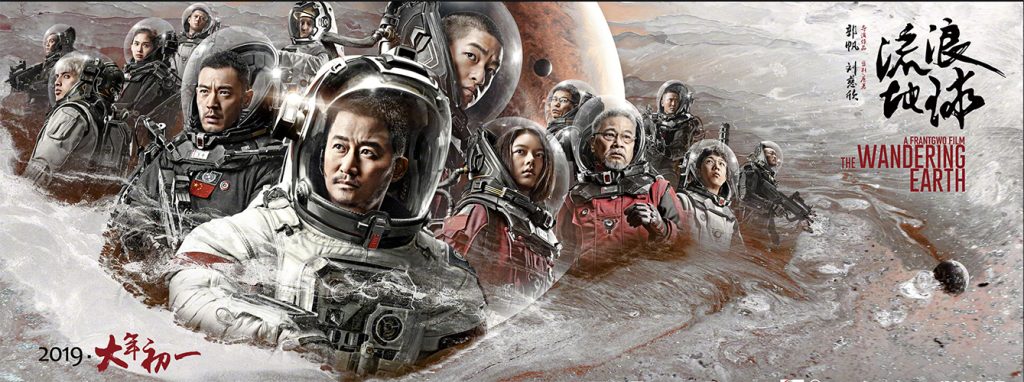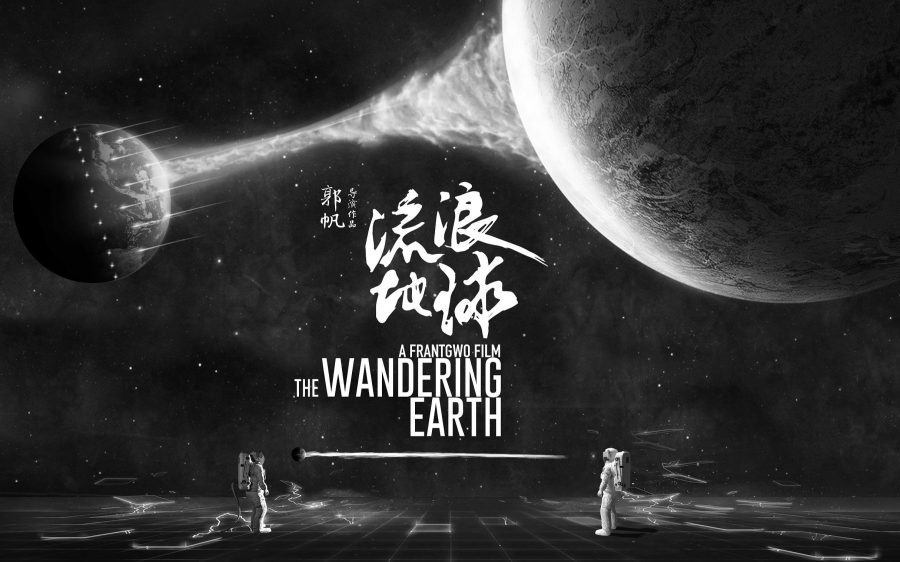“The Wandering Earth” (ŠÁüŠÁ¬ňť░šÉâ) marked a major turning point for ChinaÔÇÖs film industry when it was released in 2019. Directed by Frant Gwo and based on a novella by renowned sci-fi author Liu Cixin, it became a box office sensation and one of the highest-grossing Chinese films of all time. This film, with its impressive visual effects, large-scale production, and a storyline centered around collective action and global cooperation, not only signaled ChinaÔÇÖs potential to create world-class blockbusters but also highlighted the countryÔÇÖs ambitions to be a global leader in the film industry.

- The YouTube Influence: Global Reach and Reception
Despite being made for the Chinese market, “The Wandering Earth” quickly gained international attention, including on platforms like YouTube. Various reviews, reaction videos, and analyses by international critics revealed a strong global curiosity toward this Chinese sci-fi epic. YouTube, as a global platform, played an essential role in amplifying the filmÔÇÖs reach, allowing Chinese cinema to be showcased to a much wider audience.
Here are a few key takeaways from YouTube analyses:
- Visual Spectacle: YouTube reviews frequently praise the filmÔÇÖs stunning visual effects. Many compared the filmÔÇÖs CGI to Hollywood blockbusters, showcasing China’s growing technical prowess in film production. Commenters highlighted that, while the special effects were not always flawless, the scale and ambition were on par with international standards.
- Cultural Contrast: A recurring theme in reviews was how “The Wandering Earth” differed from typical Hollywood narratives. Many YouTubers appreciated the filmÔÇÖs focus on **collectivism**ÔÇöthe idea that humanity must work together to save the EarthÔÇöover individual heroism, which is more common in Western sci-fi. This distinct cultural perspective was refreshing for global viewers, showcasing how Chinese values could be embedded in large-scale cinematic experiences.
- Mixed Criticism: While many were impressed by the technical achievements, some YouTube critics pointed out weaknesses in the plot, character development, and pacing. This highlights a challenge for China’s film industry: as it seeks to make a mark internationally, it must refine storytelling and character arcs to meet the expectations of diverse audiences.
2. The Cultural Significance of “The Wandering Earth
Beyond its technical and narrative achievements, “The Wandering Earth” also holds significant cultural value for ChinaÔÇÖs film industry. It represents:
- A Shift to Science Fiction: Traditionally, ChinaÔÇÖs most successful films were historical dramas, comedies, or patriotic war epics. “The Wandering Earth” showed that Chinese filmmakers could succeed in the sci-fi genre, a space that had long been dominated by Hollywood. Its success opened doors for more Chinese sci-fi films, such as “The Three-Body Problem” adaptation, which is highly anticipated globally.
- National Pride: For Chinese audiences, the film instilled a sense of national pride. It proved that China could create a film that not only competed with Hollywood in terms of production quality but also told a uniquely Chinese story. The emphasis on collectivism, sacrifice, and working toward a shared future resonated with domestic viewers and showcased a different kind of heroism than seen in Western cinema.
- Government Support and Soft Power: The film also benefited from the Chinese governmentÔÇÖs push to promote Chinese culture globally. The success of “The Wandering Earth” aligns with China’s broader soft power strategy, where cultural exports, including films, are seen as tools for increasing China’s global influence. This strategic backing provides a strong foundation for future projects that aim to showcase Chinese values and innovation to the world.

3. The Future of ChinaÔÇÖs Film Culture Industry
ÔÇťThe Wandering EarthÔÇŁ is a significant milestone, but itÔÇÖs only the beginning of ChinaÔÇÖs evolving film industry. Looking to the future, here are some trends and predictions:
- Continued Growth in Science Fiction and Fantasy: As demonstrated by the success of ÔÇťThe Wandering Earth,ÔÇŁ domestic audiences are eager for homegrown sci-fi and fantasy films. The adaptation of Liu CixinÔÇÖs The Three-Body Problem is expected to further boost this trend. According to the China Film Industry Research Report, science fiction has immense market potential in China, and with advancing technology and changing audience tastes, sci-fi films will become a key driver of growth in the Chinese film marketŃÇÉ3ŃÇĹ.
- Increasing Global Collaborations: WeÔÇÖre likely to see more collaborations between Chinese and international filmmakers. Hollywood and Chinese studios have already started partnering on co-productions, blending the strengths of both industries. Films like The Great Wall (2016) and Mulan (2020) are classic examples of such collaborations. These partnerships help bring more Chinese stories to international audiences while ensuring they resonate with global viewersŃÇÉ4ŃÇĹ.
- Technological Advancements: ChinaÔÇÖs rapid advancements in artificial intelligence, virtual reality, and augmented reality will likely influence future filmmaking. According to The Hollywood Reporter, Chinese film companies are actively adopting AI technology for special effects and content production, particularly in visual effects. This trend is expected to greatly enhance ChinaÔÇÖs competitiveness in the film industryŃÇÉ5ŃÇĹ.
- Diverse Storytelling: While big-budget blockbusters will continue to dominate, thereÔÇÖs also room for more diverse storytelling. Chinese independent films, documentaries, and smaller productions are gaining attention internationally, particularly at film festivals. In 2019, the film So Long, My Son won two Silver Bears at the Berlin Film Festival, marking the rise of Chinese independent cinemaŃÇÉ6ŃÇĹ.
- Government Influence: The Chinese government will continue to play a significant role in the development of the film industry. State support can boost the production and distribution of domestic films, but censorship and creative restrictions are challenges filmmakers must navigate. In the future, finding a balance between creativity and policy requirements will remain a key challenge for Chinese filmmakersŃÇÉ2ŃÇĹ.
4. Conclusion
“The Wandering Earth” not only showcased the technical prowess of ChinaÔÇÖs film industry but also demonstrated its cultural power. It marked the beginning of a new era for Chinese cinema, one where China could tell its own stories on a global stage. Platforms like YouTube played a vital role in giving the film international exposure, helping Chinese filmmakers understand what resonates with global audiences.
As we look to the future, ChinaÔÇÖs film culture industry is poised to expand, with science fiction, global collaborations, and technological advancements leading the way. The question now is: Can China continue to produce films that not only impress domestically but also captivate global audiences in the long run? If “The Wandering Earth” is any indication, the answer is a resounding yes.
References
- Accented Cinema. (2019, July 4). The Wandering Earth: How to tell a Chinese Story | Video essay [Video]. YouTube. https://www.youtube.com/watch?v=AUhD9WQrdgE
- China Daily, ÔÇťHow Government Policies Shape ChinaÔÇÖs Film IndustryÔÇŁ, 2021.
- China Film Industry Research Report, 2020, Peking University Press.
- The Hollywood Reporter, ÔÇťChina-Hollywood Co-Productions: Successes and FailuresÔÇŁ, 2021.
- The Hollywood Reporter, ÔÇťChinaÔÇÖs Use of AI in Film ProductionÔÇŁ, 2022.
- Variety, ÔÇťBerlin: Chinese Drama ÔÇśSo Long, My SonÔÇÖ Wins Two Silver BearsÔÇŁ, 2019.


The author takes the Chinese film The Wandering Earth as an example to discuss the cultural industry. As a major turning point of Chinese science fiction films, this film also shows the gradual promotion of China’s cultural industry.
The blogger used the excellent work “The Wandering Earth” to prove the Chinese film industry. I was fortunate enough to have seen this movie and the novel by the original author Liu Cixin, so I know this movie very well and agree with the blogger’s praise for it. The article expressed the importance of this revolutionary film “The Wandering Earth” to the Chinese film market through the global box office feedback of “The Wandering Earth”, its cultural significance and its impact on the future of China’s film and television industry.
It seems that your post has given me a profound understanding of the profound impact of the movie ‘The Wandering Earth’ on the Chinese film industry. And you also combined YouTube’s evaluation of this movie to better showcase its strengths. I think you can write more specifically here, such as how he improved industry standards and production processes. Here are some of my views. Through high-level special effects and visual effects, “The Wandering Earth” has raised the technical standards of the entire industry, prompting other film production companies and teams to continuously pursue excellence in technology. The complex production process and large-scale team collaboration of movies provide valuable experience and reference for the industry, promoting the standardization and professionalization of the production process. At the same time, I believe that this movie inspires a spirit of innovation. For example, in terms of theme innovation, its success proves the potential of science fiction themes in the Chinese market, inspiring more filmmakers to try and explore new themes and genres. There is also narrative innovation, the unique narrative style and worldview setting in movies encourage creators to innovate in narrative structure and story expression. In short, I have learned a lot from your post and will continue to study the cultural industry impact of something from multiple perspectives. Thank you.